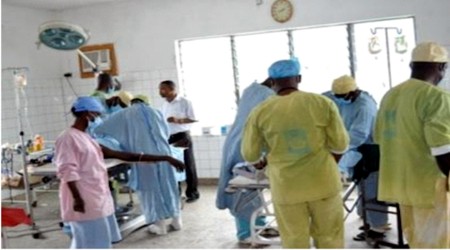Algeria has confirmed a case of Covid-19 (coronavirus), thus, making it the second African country to report the disease outbreak.
The disease, which originated from China in December, has spread to about 30 countries across the world.
The World Health Organisation, WHO in a statement released on Tuesday said the Covid-19 was detected in an adult Italian who arrived in the country February 17.
WHO said that the case was reported by the ministry of health, population and hospital reform of Algeria.
The health authorities report that “tests indicate that an Italian adult who arrived in the country on February 17 has tested positive for coronavirus disease” .
This is the first Covid-19 case reported in the country, and the second on the continent.
WHO is already preparing to deploy a team of experts to Algeria to support health authorities.
Meanwhile, Italy has been reporting increasing cases of the outbreak with 283 confirmed cases and 11 deaths.
Outside China, there have been growing concerns about the spread of the disease in three countries – Iran, South Korea and Italy.
Most of the 79,000 confirmed coronavirus cases to date are in China’s Hubei province, but more than 2,000 cases have now been reported in over 30 countries.
Africa in the past 14 weeks of the outbreak has been spared, “but the window seems to be closing”, officials said.
The first case was reported earlier this month in Egypt. Under the WHO zoning, Egypt belongs to the WHO Eastern Mediterranean region.
The Algeria case is the first in the WHO African region. Algeria is one of the 54 countries on the African continent.
The WHO Regional Director for Africa, Matshidiso Moeti, said “the window of opportunity the continent has had to prepare for coronavirus disease is closing and countries must ramp up their preparedness activities.”
Meanwhile, WHO Director-General, Tedros Ghebreyesus, on Monday said the sudden increase was “deeply concerning”.
He had earlier said the world is scared of the disease being transported to Africa because African health systems would be ill-equipped to respond to the deadly coronavirus outbreak.
With the report of this new case, it implies that all Africa countries, especially the 13 countries which had earlier been identified as the high risk, are to enhance their surveillance and preparedness.
WHO in preparation for the an eventual importation of disease had listed 13 Africa countries (Egypt, Algeria, South Africa, Nigeria, Ethiopia, Morocco, Sudan, Angola,Tanzania, Ghana, Kenya, Rwanda and Tunisia) as having the highest ‘importation risk’.
These countries have been WHO’s top priority for preparedness measures due to their direct links or high volume of travel to China.
The respiratory disease, which has killed over 2000 people, is capable of spreading through human-to-human contact, droplets carried through sneezing and coughing, and germs left on inanimate objects.
Symptoms of the disease can include a sore throat, runny nose, fever or pneumonia and can progress to multiple organ failure or death in some severe cases.
Knowing the importance of early diagnosis and treatment, WHO has been assisting countries, especially the “low and middle income countries,” establish diagnosis capacity, in the eventuality of its spread to their territory.
Mr Ghebreyesus said WHO is working to equip laboratories with the capacity to rapidly diagnose cases.
Presently, WHO African region now has over 20 laboratories with three in Nigeria.
Also, medical supplies such as masks, gloves, gowns and diagnostic tests have been sent to many countries in Africa, especially those on the priority list. Training of health personnel are also ongoing in many countries.

